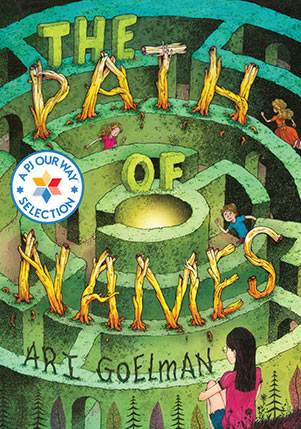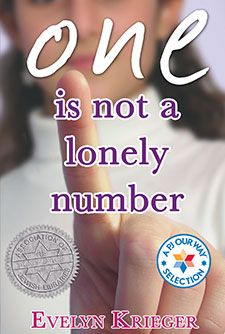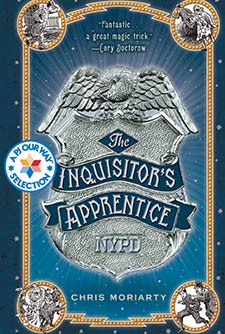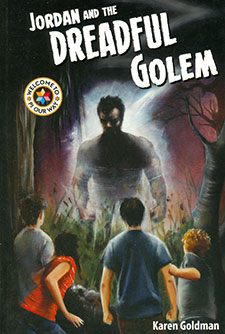The Path of Names
Dahlia's bunkmates at summer camp think she's super strange. She sees ghosts walk through walls and she's beginning to think she's possessed! If only Dahlia could have gone to math camp...
Average Rating
( hint: Login to leave a review! )
156 Reviews
Leave Review
What the Book is About
Jewish Content & Values
Positive Role Models
Content Advisory
Talk it Over!
More for You
What the Book is About
Thirteen-year-old Dahlia would much rather be doing math or practicing her magic tricks than going to Jewish summer camp. But Camp Arava gets much more interesting when Dahlia sees ghosts walking through her cabin wall and when she begins dreaming about David Schank, a brilliant Yeshiva student who lived many years ago. It turns out that Schank was on the run from a gang of “Illuminated Ones” who discovered that he held secret, mystical knowledge. Now, many years later, it is up to Dahlia to thwart the Illuminated Ones’ leader, the “Most Illuminated One,” and continue Shank’s battle against evil – right on the grounds of Camp Arava.
Jewish Content & Values
- Dahlia is encouraged to go to Jewish summer camp, so she can meet other Jewish kids. At camp, announcements are made in Hebrew, and Dahlia is introduced to Israeli counselors and activities like Israeli dancing.
- Significant plot points are based on Kabbala (Jewish mysticism), including the use of gematria (assigning numerical values to Hebrew letters to extract hidden meaning).
- Dahlia has dreams about David Schank’s life as a Hasidic Jew and his relationship with his rebbe (a religious leader of a Jewish Hasidic sect).
Positive Role Models
- Rafe is Dahlia’s loyal and understanding friend. While other campmates laugh at Dahlia’s ghost stories, Rafe believes her and helps her on her quest for the truth. Although he hints to others that he and Dahlia are a couple when they really aren’t, he later apologizes and even designs a lightning guard for Dahlia, which saves her life!
- Tom, Dahlia’s brother, doesn’t always treat his sister as nicely as he should, but he does try to protect her and ultimately supports her plan to distract Barry, the groundskeeper.
- David Schank uses his last bit of strength to protect children from the maze by creating Barry, the golem (a creature from Jewish folklore, created by magic to serve its owner). His good intentions bring him back to haunt Dahlia as an ibur (a good spirit who returns to the earth to do a mitzvah (a good deed).
Content Advisory
This book is a fantasy thriller. The following could be emotionally difficult:
- Dahlia is possessed by the ibur (spirit) of David Schank. She has dreams about his life, including how he and others died. In one scene, she wakes up hearing his voice come out of her mouth.
- Barry, the camp caretaker, initially seems creepy and mean, but he is actually a golem, created years ago by David Schank to protect children from McMaster (the Most Illuminated One).
- Attempting to rescue her friends from the maze, Dahlia is stabbed by McMasters’s ghost. She uses the blood from her wound to write the Hebrew words that break the maze’s spell.
- Some typical camp behavior is described: underage counselors smoke and drink; Chelsea raises her middle finger at Dahlia; and there are a few mild sexual references (such as the campers requesting an SOS session on sex).
Talk it Over!
When David discovered the 72nd name of God, he was one of the most promising young scholars in the famous Yebavner Yeshiva. Still, the Rebbe sent David away from the world he knew in order to protect the community. Do you think that was the right thing to do? What alternative choice could the Rebbe have made?
More for You
Jewish Summer Camps: Today, American Jewish summer camps are cited as one of the biggest factors in helping to create lasting Jewish identity. Started in the late nineteenth century, Jewish camps were places where children could escape crowded cities and breathe the fresh air of the country. While there were religious and ideological camps, many of the early Jewish camps were more socially oriented. After WWII, the focus of Jewish camping changed. The Orthodox, Conservative, and Reform movements each opened their own camps, as the different denominations recognized the powerful opportunities for informal education that Jewish summer camps offered. Today, hundreds of Jewish camps exist, with focuses on Hebrew, Israel, Jewish culture, kibbutz life, outdoor action, and observance.
What the Book is About
What the Book is About
Thirteen-year-old Dahlia would much rather be doing math or practicing her magic tricks than going to Jewish summer camp. But Camp Arava gets much more interesting when Dahlia sees ghosts walking through her cabin wall and when she begins dreaming about David Schank, a brilliant Yeshiva student who lived many years ago. It turns out that Schank was on the run from a gang of “Illuminated Ones” who discovered that he held secret, mystical knowledge. Now, many years later, it is up to Dahlia to thwart the Illuminated Ones’ leader, the “Most Illuminated One,” and continue Shank’s battle against evil – right on the grounds of Camp Arava.
Jewish Content & Values
Jewish Content & Values
- Dahlia is encouraged to go to Jewish summer camp, so she can meet other Jewish kids. At camp, announcements are made in Hebrew, and Dahlia is introduced to Israeli counselors and activities like Israeli dancing.
- Significant plot points are based on Kabbala (Jewish mysticism), including the use of gematria (assigning numerical values to Hebrew letters to extract hidden meaning).
- Dahlia has dreams about David Schank’s life as a Hasidic Jew and his relationship with his rebbe (a religious leader of a Jewish Hasidic sect).
Positive Role Models
Positive Role Models
- Rafe is Dahlia’s loyal and understanding friend. While other campmates laugh at Dahlia’s ghost stories, Rafe believes her and helps her on her quest for the truth. Although he hints to others that he and Dahlia are a couple when they really aren’t, he later apologizes and even designs a lightning guard for Dahlia, which saves her life!
- Tom, Dahlia’s brother, doesn’t always treat his sister as nicely as he should, but he does try to protect her and ultimately supports her plan to distract Barry, the groundskeeper.
- David Schank uses his last bit of strength to protect children from the maze by creating Barry, the golem (a creature from Jewish folklore, created by magic to serve its owner). His good intentions bring him back to haunt Dahlia as an ibur (a good spirit who returns to the earth to do a mitzvah (a good deed).
Content Advisory
Content Advisory
This book is a fantasy thriller. The following could be emotionally difficult:
- Dahlia is possessed by the ibur (spirit) of David Schank. She has dreams about his life, including how he and others died. In one scene, she wakes up hearing his voice come out of her mouth.
- Barry, the camp caretaker, initially seems creepy and mean, but he is actually a golem, created years ago by David Schank to protect children from McMaster (the Most Illuminated One).
- Attempting to rescue her friends from the maze, Dahlia is stabbed by McMasters’s ghost. She uses the blood from her wound to write the Hebrew words that break the maze’s spell.
- Some typical camp behavior is described: underage counselors smoke and drink; Chelsea raises her middle finger at Dahlia; and there are a few mild sexual references (such as the campers requesting an SOS session on sex).
Talk it Over!
Talk it Over!
When David discovered the 72nd name of God, he was one of the most promising young scholars in the famous Yebavner Yeshiva. Still, the Rebbe sent David away from the world he knew in order to protect the community. Do you think that was the right thing to do? What alternative choice could the Rebbe have made?
More for You
More for You
Jewish Summer Camps: Today, American Jewish summer camps are cited as one of the biggest factors in helping to create lasting Jewish identity. Started in the late nineteenth century, Jewish camps were places where children could escape crowded cities and breathe the fresh air of the country. While there were religious and ideological camps, many of the early Jewish camps were more socially oriented. After WWII, the focus of Jewish camping changed. The Orthodox, Conservative, and Reform movements each opened their own camps, as the different denominations recognized the powerful opportunities for informal education that Jewish summer camps offered. Today, hundreds of Jewish camps exist, with focuses on Hebrew, Israel, Jewish culture, kibbutz life, outdoor action, and observance.




